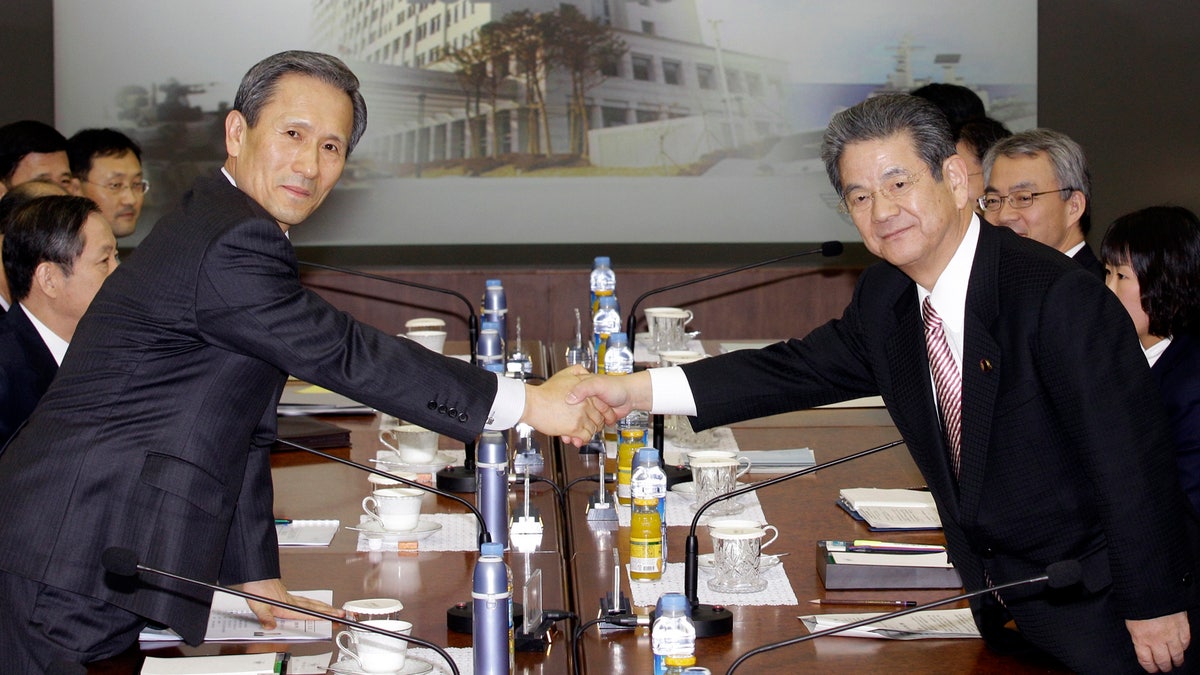
Jan. 10: South Korean Defense Minister Kim Kwan-jin, left, shakes hands with his Japanese counterpart Toshimi Kitazawa before their meeting at the Defense Ministry in Seoul, South Korea. (AP)
SEOUL, South Korea – South Korea and Japan held military talks Monday on accords to share intelligence and provide each other with fuel and medical support, officials said, in what would be their first military agreement since Tokyo's brutal colonial rule of the Korean peninsula ended in 1945.
Seoul and Tokyo are important trading and diplomatic partners, but the possibility of such a military pact is a sensitive topic in South Korea, where many people still harbor strong resentment against Japan's 35-year occupation. Bilateral ties often suffer over territorial and historical disputes stemming from the colonial legacy.
Monday's talks, however, came as Tokyo and Seoul struggle to deal with a shared worry over North Korean aggression, including the deadly shelling of a front-line South Korean island on Nov. 23.
South Korean Defense Minister Kim Kwan-jin and his Japanese counterpart Toshimi Kitazawa met Monday for talks on the military accords, North Korea's nuclear weapons programs and the artillery attacks, according to the South Korean Defense Ministry.
The accords are aimed at strengthening defense cooperation by sharing important intelligence, mostly on North Korea, and assisting each other's military with fuel and medical supplies during peacekeeping operations abroad, a Defense Ministry official said.
The official, who requested anonymity citing the issue's sensitivity, said the accords won't be signed during Monday's one-day talks. It was unclear when the signing could happen.
Ahead of the talks, a dozen activists rallied near the Japanese Embassy in Seoul, chanting slogans like "We oppose (the accords)!" More than 20 police officers guarded the Embassy and watched over the demonstrators.
"How can South Korea-Japan military cooperation be possible without resolving the issue of Japan's past wrongdoing?" the activists asked in a statement distributed at the protest site.
Last year marked the 100th anniversary of Japan's annexation of the Korean peninsula, which ended with Tokyo's defeat in World War II in 1945. Historians say that hundreds of thousands of Koreans were forced to fight as front-line soldiers, work in slave-labor conditions or serve as prostitutes in brothels operated by the Japanese military.
In August, Japanese Prime Minister Naoto Kan offered a renewed apology days ahead of the anniversary. South Korean President Lee Myung-bak later said that Seoul and Tokyo should never forget history but should also work together for a new future.
Some South Korean activists, however, want a more sincere apology from Japan and compensation for past wrongdoing.
Despite their harsh history, South Korea and Japan have been getting closer economically, diplomatically and culturally in recent years.
Two-way trade volume reached about $71 billion in 2009, with Japan ranked as South Korea's third-largest trading partner after China and the European Union.
South Korean popular entertainment enjoys an avid following in Japan, while Japanese pop culture, including comic books and TV dramas, is also popular among young South Koreans.
The two countries — both important U.S. allies that host tens of thousands of American troops — have also been working together to defuse tension over North Korea's nuclear program as members of now-stalled six-nation disarmament talks.
___
Associated Press writer Haeran Hyun contributed to this report.
